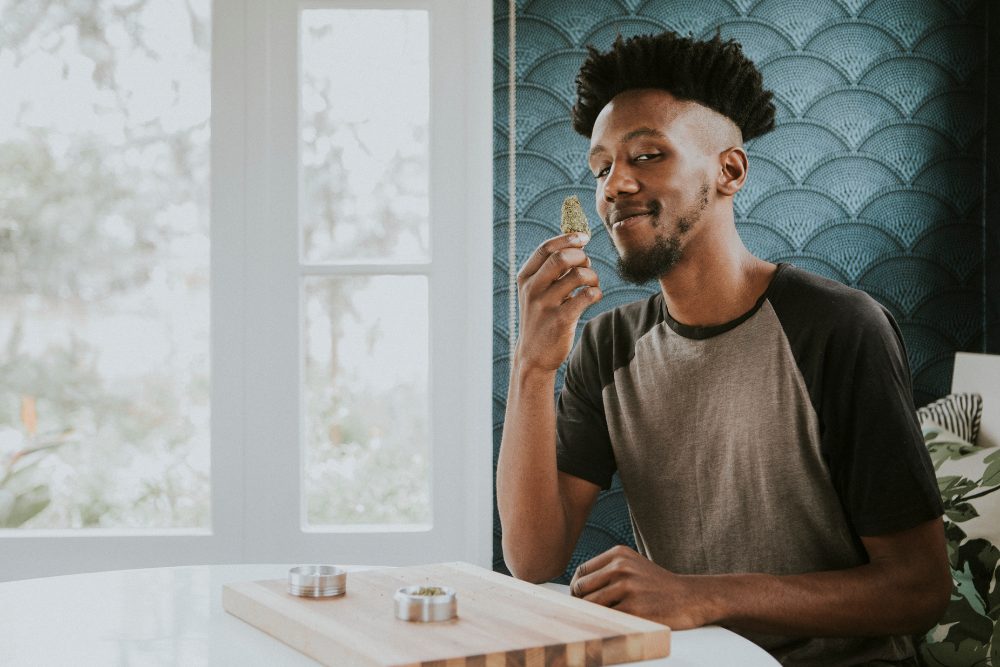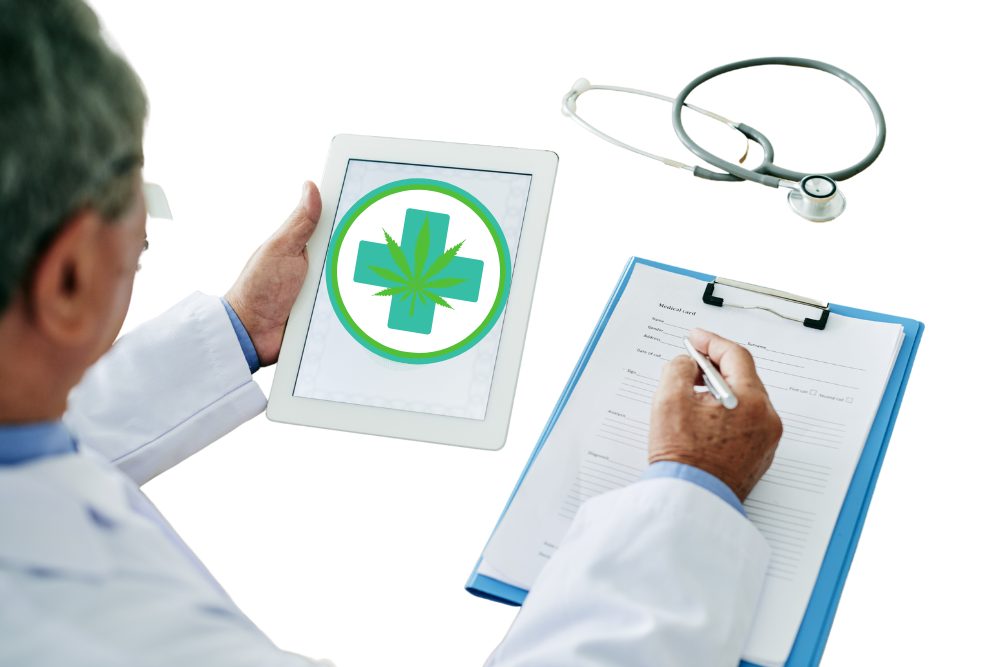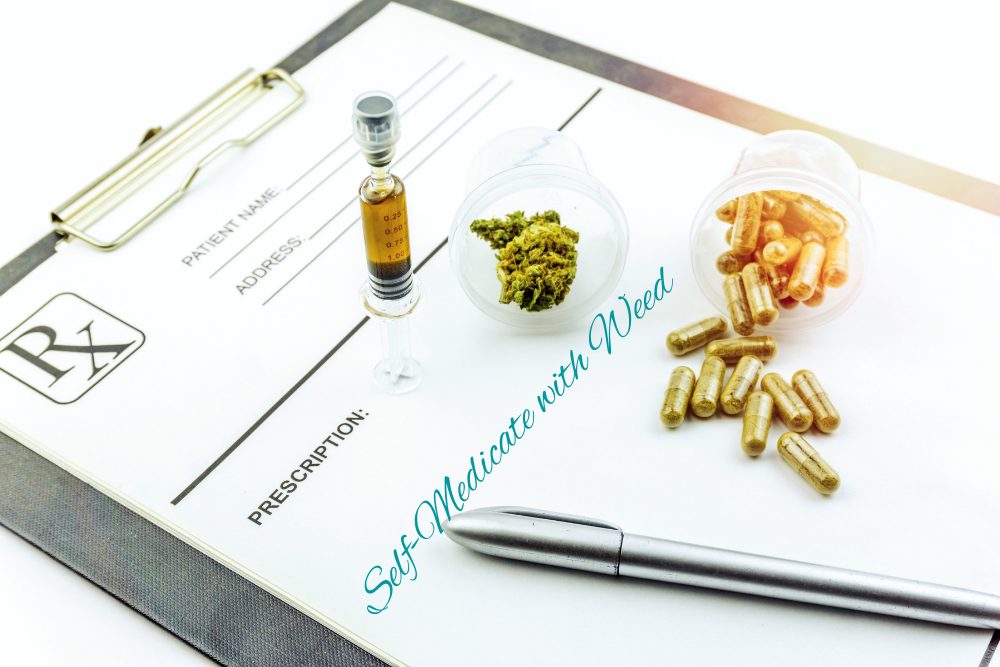
If you’re reading this, you’re probably familiar with the medicinal or therapeutic benefits of marijuana. Widely heralded as a miracle medicine by many, the plant has properties that can improve many physical and mental health symptoms.
With the legalization of cannabis for medicinal and recreational use in different states across the country comes concerns about self-medication. Many people self-medicate with marijuana because it improves their health concerns, raises their moods, and reduces their need for prescription medications and store-bought remedies. Though cannabis is considerably less harmful than alcohol, cigarettes, recreational narcotics, and many big pharma meds, self-medicating can lead to severe or long-term problems for some users.
Despite the potential risks, self-medicating with marijuana remains a popular choice for an overwhelming majority of patients with health and medical conditions. Anyone contemplating using cannabis to self-medicate without professional authorization or guidance should consider the following information.
Self-medication is not a new concept; it’s as old as time. Despite the name, self-medication is not something that’s immediately established after first use. Self-medication is a behavior that develops from habitual, long-term, or chronic use of substances, medications, or narcotics to alleviate health problems or to feel good without medical authorization or guidance.
It’s well-documented that marijuana can help with various health and medical disorders, such as chronic pain, inflammation, insomnia, appetite, libido, and low moods. Though many states across the country have finally paved the way for medical patients to safely and legally treat themselves with marijuana, there are jurisdictions where adult use is also allowed.
Easing legal restrictions, increasing awareness, societal acceptance and accessibility are common reasons why cannabis use remains so widespread among adults. Marijuana is the most used illicit drug in the US, with over 49 million users within the last 12 months alone. And that trend shows no signs of slowing down.
Marijuana is associated with addiction and substance abuse disorders like fentanyl, oxycodone, hydrocodone, Xanax, and other commonly prescribed medications. Marijuana, in particular THC, contains a cannabinoid that has interactions with the reward center in the brain.
THC (delta-nine tetrahydrocannabinol) is an exogenous cannabinoid that closely resembles 2-AG (Anandamide), one of the first discovered endocannabinoids in the human body. When THC enters the body, it binds with specific receptors in the brain’s ECS or endocannabinoid system, influences the reward system, triggers dopamine release, and reduces GABA availability. Dopamine is responsible for the high or euphoric sensation widely associated with THC.
Frequent and prolonged cannabis use modulates the brain’s reward system, increasing the possibility of misuse and addiction, especially in young adults whose brains are still developing. For many, self-medicating with cannabis is the way to go for the short term. Despite negative perceptions and the potential long-term effects, many people safely use marijuana without serious side effects.

How do you know if your medical or recreational use crosses the threshold for self-medication and is entering abuse or misuse territory? Everyone has different tolerances and reasons for using cannabis. Yet, some common behaviors indicate that moderation or cessation may benefit some users. The following signs of misuse can occur when self-medicating with cannabis.
One of the most common reasons for self-medicating with cannabis is to treat depression and mood disorders. Irritability and anger are common symptoms associated with these conditions. If you use weed to manage your symptoms and improve your mental health, your risk of dependency is higher than someone who uses cannabis medicinally for physical health symptoms.
Many people rely on marijuana to alleviate their sad and dark thoughts so they can function and feel better about themselves and their circumstances. However, the most abundant cannabinoid in marijuana, THC, has a dampening effect on moods. THC-rich strains can worsen mental health issues, emotions and mood symptoms in some individuals.
Prolonged use can lead to tolerance concerns. Tolerance issues can occur when users need more of a substance to experience the same or similar effects usually associated with lower amounts. As tolerance increases, so does the desire and unhealthy dependence on the substance. Signs of tolerance and potential substance dependency issues include:
When ranked on a scale of intoxicating and addictive properties, cannabis ranks significantly lower than alcohol. Despite being more accepted and its classification as a non-banned substance, alcohol carries a significantly higher risk of abuse and harmful side effects than cannabis. Every year, alcohol abuse causes 95,000 deaths. Currently, there are no documented deaths attributed to cannabis drug use.
However, heavy cannabis use can lead to substance abuse in some individuals prone to mental illness. Irritability is often a good indicator of tolerance and risk-seeking behaviors. It can lead to mental disorders such as mania, panic disorder, psychosis, worsening depression, or anxiety symptoms without proper intervention.
One of the most damaging aspects of self-medicating with any substance involves social anxiety, avoidance, and isolating behaviors. There’s nothing wrong with wanting time to yourself occasionally. But, if you find yourself passing on invites from friends or loved ones or spending more time alone because it makes you feel better, or you prefer to use cannabis instead, you could be experiencing one of the downsides of self-medicating with cannabis or anxiety.
Social distancing and avoidance behaviors are common among adults who feel guilty, ashamed or embarrassed by their self-medicating cannabis needs. Certain strains of cannabis are known to induce or increase anxiety in some people. Social avoidance is a form of anxiety that impacts over 15 million people and increases the risk of additional mental health concerns and substance abuse.
Marijuana can be habit-forming for some individuals. Long-term or chronic use can lead to addiction. Despite awareness, many people end up using marijuana any time they experience unpleasant events or receive negative news or information.
If you find yourself reaching for a bong or spliff every time you encounter a stressful situation or emotions, it may be time to consider alternative outlets to develop more beneficial coping mechanisms. A tolerance break or medical professional can help.
Marijuana dependency is a real problem for individuals who are unable to process or resolve their emotions or reactions without dosing with cannabis. It’s beneficial to develop healthy coping skills to decrease the urge and pressure to self-medicate solely for the purpose of avoiding anger, depression, irritability, and other negative emotions.
Marijuana is a substance that can cause psychosis in some users. Psychosis involves delusional or hallucination thoughts, such as seeing or hearing people and things that are not there. Psychosis is not pleasant and can be dangerous. Cannabis users who experience drug-induced psychosis are likely to have future occurrences.
For decades, cannabis has been perceived as a toxic and harmful substance due to its psychotropic effects. Now that researchers have identified THC as the hallucinogenic molecule or cannabinoid in the cannabis sativa plant, users can minimize this risk by avoiding cannabis THC-rich strains.
Despite knowing the risks and signs of substance or chemical dependence, many users are unaware of how to spot the signs. The following questions can help users determine if their self-medicating cannabis habits are unhealthy.
If you answer yes to at least one of the above questions, it’s time to see a medical provider to learn if your cannabis treatment habits are unhealthy and putting you at risk of unhealthy dependence. If you’re concerned about the risks of self-medicating, you may benefit from using cannabis medicinally as a patient.
Despite the risks and known consequences, many people safely medicate with marijuana everyday. If you decide that self-medicating is the way to go, consider the following suggestions to reduce your risks.
Consider getting a medical marijuana treatment or recommendation card. Finding the right marijuana strain and treatment type often involves some trial and error. Seeing a medical cannabis doctor for a health evaluation is a fast, convenient, and safer way to learn strains, product forms, and potencies that are best suited for your dosing needs. A recommendation card can help you save time and money because treatment pricing for medical cannabis patients is cheaper and more affordable than self-medicating or recreational use.

Some states have adult-use laws that decriminalize the possession and use of marijuana for self-medication purposes. Though many people find it easier and more convenient to follow those regulations when self-medicating, those benefits pale in comparison to the advantages medical cannabis patients enjoy.
Product Quality – Not everyone who self-medicates uses marijuana from safe or legally approved sources. Though the street market is alive and well, there is no way to determine the quality of ingredients or cannabis products. Using street weed comes with many risks associated with addictive street and pharmacological narcotics, such as contaminants. Product impurities often increase the risk of dependence and lead to adverse or life-threatening side effects or even overdose.
Medical patients use marijuana products that are regulated by state-approved producers, vendors, and retailers. These products undergo stringent quality control measures to ensure they are not laced with harmful substances or contaminants. Marijuana products sold in authorized treatment centers or dispensaries are of higher quality and much safer for medical and recreational use and consumption.
Better Treatment Fit – When it comes to self-medicating with marijuana, it’s often necessary to try different strains and products before determining what works best. Medical cannabis patients don’t have to go through as much of a trial and error stage with treatments. Medical marijuana patients work with qualified medical doctors to learn suitable cannabis strains, potencies, and products that provide optimal benefits with minimal risk of adverse effects.
Whether you’ve been self-medicating with cannabis or considering it, it’s best to see a medical marijuana doctor to discuss your circumstances. You know your body and symptoms best. However, proper medical guidance is beneficial for tracking your treatments and progress and helping you avoid the dangers and issues associated with self-medication.
No Information on MarijuanaDoctors.Com should be used to diagnose, treat, prevent or cure any disease or condition. You can view our Full Disclaimer here.